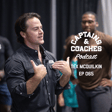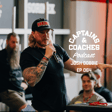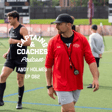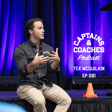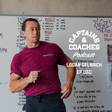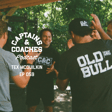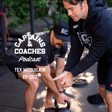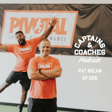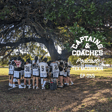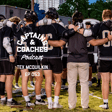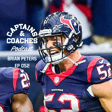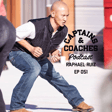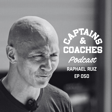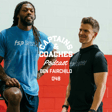Baseball Showcases: Focus on Metrics
00:00:00
Speaker
These kids go to prospect showcases. They go to these events where all they're going to do is run a 60, do some pull downs, and they're gonna hit in a cage with the track man attached to it.
00:00:12
Speaker
And all they're trying to do is see like, what's the biggest number coming off the bat, what ball's moving the most off the mound, and like which kid, you know, runs the fastest. So that happens at such an early stage in baseball.
00:00:26
Speaker
And I don't think it happens in football, because I think in football, we all understand that like the body's not done developing yet. Like don't make the 14 year old do a combine, make the 14 year old get really good at football.
00:00:38
Speaker
Whereas in baseball, we're like, make that 12-year-old sprint. Let's see how
Introduction to the Podcast
00:00:42
Speaker
it goes. Welcome to the Captains and Coaches podcast. We explore the art the science of leadership through the lens of athletics and beyond. I'm your host, Tex McColkin, and today we are on location in South Florida with Andrew Mitchell, strength and conditioning coach for the Tampa Bay Rays organization.
00:00:58
Speaker
Andrew's coaching path to professional baseball is anything but traditional. We take that journey with him learning how working with Parkinson's patients and mastering the art of motivation as a personal trainer led Coach Mitchell to guiding million dollar athletes through injury recovery and into peak performance.
00:01:17
Speaker
Andrew shares how he communicates with everyone from rookie prospects to veteran all-stars. Plus, we explore the mental health challenges facing professional athletes today, the intersection of rehab and performance, as well as why Andrew believes coaching is ultimately a people business and not a programming business. Now,
Andrew's Unconventional Coaching Journey
00:01:36
Speaker
let's hand it off to Coach Mitchell to help us raise the game. Ready, ready, and hooray.
00:01:42
Speaker
Action. Welcome to sunny Tampa Bay. What's Florida's nickname, the Sunshine State? Sunshine State. um'm I'm loving every minute of it, because I parked and it was sunny. And then we were hanging out in here, and we walked around campus here yep for the Tampa Bay Rays, and then it just started raining on us. You've gotten two rainstorms in your first 20 minutes of being here.
00:02:02
Speaker
I don't think there's a better way to be welcomed into Florida. No, i the humidity, I love it. It's what keeps my hair up slick. So umm I'm having fun here. Yeah. Well, this saw a lot of action this morning. Dudes were training. You got here at 6 a.m.
00:02:16
Speaker
or you're 5 a.m.? m I'm a 5 a.m. guy. I show up at 5, yeah. 5 a.m. When do you get your lift in? my lift My lift starts at 5. Okay. Yeah, so coaches, they got until 8 a.m. to get it done.
00:02:28
Speaker
We have until 7, so we got to meet and discuss what's going to happen in the weight room. So we meet and discuss at 7. My lift's already done or if there's traffic, because you experienced my drive today too.
00:02:40
Speaker
ah Sometimes there's only 30 minutes in. But we get it in and get ready to go by 8, and from 8 to 3, it's just nonstop. You're on. Yeah. Yeah, and we have a beautiful facility here in...
00:02:53
Speaker
Port Charlotte. Port Charlotte. Yeah, that's right. I'm like, all right. But yeah, man, I'm fortunate for the opportunity to come here speak. We connected at NSCA Coaches Conference. Yeah. Just one of those passerbys.
00:03:04
Speaker
And then you you said, what's up? Yeah. I'm grateful for that because then you connected me to Coach Eric Hernandez at a UNC. Mm-hmm. and he's big time in the Lax community, so i was grateful for that. Yeah. And I know your journey didn't start at UNC. It eventually got there, and you were a basketball guy, not a baseball guy.
00:03:22
Speaker
Right. Which is hilarious, because baseball guys are usually just baseball guys, but somehow you ended up here working with just baseball guys. Yeah, I would say ah out of everyone on this campus, I have the least amount of baseball experience, and that includes the coach's kids that come by. um Yeah, I was a basketball player, ah had hopes and dreams of playing high-level college basketball. um I was unfortunately just one of those kids that played tough, hit my head a lot.
00:03:53
Speaker
and i wanted to walk on at Elon University where I went to school. And when you're a kid who's hit their head a lot and you're also on good six two on a good day Tall, right? Yeah, you know, ah they they tell you pretty early on, hey, probably not gonna work out.
00:04:11
Speaker
But I got to start coaching pretty early in my life and I'm thankful that basketball got me to that point. There you go. So it's all part of that journey and that's that's the aim of a great coach is to turn your experience into experience that you can hand off to others. Absolutely. And were you studying strength and conditioning, health? What was the direction at Elon?
00:04:30
Speaker
Yeah, so I was an exercise science major, and um going into college, I knew that I wanted to be a strength conditioning coach. You knew it was a profession? Yeah, I did.
00:04:41
Speaker
So I'll never forget, i was a huge North Carolina basketball fan. Naturally. Tyler Hansborough, you know, absolute stud, player of the year. And my mom, I grew in Cincinnati, Ohio.
00:04:56
Speaker
So I watched Cincinnati Bearcats, In Ohio you love LeBron, then you hate him for a little then you love him again, now we're okay with it. But um she brought me the Muscle & Fitness magazine that had Tyler Hansborough on the cover.
00:05:11
Speaker
And the centerfold was Medball 200, which was Vermeule's general prep that Jonas Serration was using with Tyler Hansborough, and Muscle & Fitness wrote that this was the key to his success.
00:05:28
Speaker
Wow. And so that got me diving deep into basketball training, got me diving deep into you know personal training and physical development at that point. I mean, I was 14 when I got that article.
00:05:44
Speaker
And I bought the NBA fit magazines, and I bought all the muscle magazines that had athletes on it. i was just obsessed with it. So by the time i was a junior in high school, i I knew what I wanted to be.
00:05:54
Speaker
Yeah. The amount of coaches that have been sparked from a magazine, yeah i mean, it's got to be half the industry. Right. And it's it was when I was at UNC, I had a chance to obviously meet Jonas.
00:06:08
Speaker
And ah it was so funny. i thanked him. I thanked him for doing that article and putting that workout in there. And I even brought up that, you know, you probably received a bunch of emails from me, like, in the early twenty ten s And ah he he said, you know, the name is super familiar. He never answered?
00:06:28
Speaker
ah He answered a couple times. But, you know, when you're ah when you're a young, excited coach and you you don't know how email servers work and, you know, you got your weird, like, AOL name that now I realize got flagged a whole bunch.
00:06:44
Speaker
Yeah, you can keep that to yourself. Yeah, you know, you learn real quick that it wasn't personal. There's just there's some things that professionals can't do. But
Returning to North Carolina and Gaining Experience
00:06:53
Speaker
I'm thankful that Jonas responded a couple of times he did.
00:06:55
Speaker
Yeah. and And your career didn't even start with performance. No. What led you to performance? Because this is a big deal. You're working with assets here with a lot of lives, a lot of money on the line. Yeah.
00:07:08
Speaker
And dudes whose career is in your hands every day. Yeah. That's a lot of responsibility and pressure. But you didn't step into the performance space early on. No, I had a personal trainer in high school.
00:07:20
Speaker
I had, now I realize, you know, I had a skill coach for basketball and I had a trainer for physical development. um I was the early wave of the ah overly committed youth athlete.
00:07:36
Speaker
And my personal trainer at that time also had ah Parkinson's class that she would train in the mornings. So I was dedicated to Muscle & Fitness magazine and growing up to be like Jonas Suration or Al Vermeule.
00:07:53
Speaker
And I was like, can i work here when I'm not playing basketball or going to school? Can I work here? She just goes, yeah, you can train the Parkinson's class. So addicted to basketball and addicted to whatever Muscle & Fitness was offering at that time.
00:08:07
Speaker
And my first job is early and late stage Parkinson's class for two hours, five days a week. And i did that I did that for two years. And I mean, that taught me a lot that I still use today when I'm working with guys that hopefully, you never know for sure, but hopefully never have to deal with the things those people were were going through.
00:08:30
Speaker
it's It's skills that have transferred throughout my entire life though. Yeah, and even the the skills that you were focused on in that two-hour class working with these individuals, they're they're so fine, but then they need to really focus and get it dialed in.
00:08:45
Speaker
But then the beauty is that focus and attention to detail that you were guiding these these people in the class is almost a skill set that led you here, where they're...
00:08:56
Speaker
their details are so fine and adjustments and focus that needs to be there. It's just at a higher level. Yeah, I mean, ah went from the Parkinson's classes in high school, and then I was a ah trainer and and trying to work my way into assistant coaching when I was in college. I would come home for the summers and work with high school kids on the track or on a football field, just doing anything I could to like get reps, just like practice even coaching someone through anything.
Client Diversity and Sales in Personal Training
00:09:25
Speaker
And then I remember when I got my first job post-college at Equinox in San Francisco, i remember feeling just incredibly over-prepared for that job. I was like, wait a minute.
00:09:36
Speaker
This, this is like my skill. This is like my wheelhouse. The sales part I had to learn. Like I had to learn that there's an aspect of like whining and dining that comes to wasn't personal training. It wasn't just personal training, you to sales and. Well, I mean, you you have to convince the people that you're the one to work with. Don't tell me you were the walk the floor guy.
00:09:58
Speaker
ah No, I wasn't the walk the floor guy. So what would happen is um the the MAs membership advisors would sell memberships and they would say, all right, free membership.
00:10:09
Speaker
You get a free fitness assessment and a complimentary training session. um At the early stages of my career, I got people who had pretty much already said they didn't care about personal training.
00:10:20
Speaker
so I'm not going to do it. And so they just toss you, m ma' just toss you bones. They're like, just treat this person, get the get the hour paycheck and move on. And um the Parkinson's story, I would tell people that.
00:10:35
Speaker
And i would say like, you know, and I just think if I could help those people walk over a door threshold, I can definitely help you lose five or 10 pounds this month. And that would click.
00:10:45
Speaker
And so those people that weren't interested in sessions, all of a sudden were buying sessions. And then, you know, you progress up in the Equinox portfolio and I'm sure we'll talk about it more as we talk about education and and teaching, but, you know, Equinox, if you're good, they'll feed you.
00:11:03
Speaker
And so all of a sudden I started getting special cases and I started getting special projects. And, um but they always had a sales aspect to them because it starts with a free session and a free assessment.
00:11:17
Speaker
And that person sits there and they're like, all right, so now what? Like, why why should I give this money to you? Why should I give my time to you? And um
Performance and Recovery
00:11:26
Speaker
just learning how to take people's Goals and aspirations and draw that line between where they are currently and where they want to be yeah and teach them like how possible it is.
00:11:38
Speaker
um i mean, that's that's a skill set that came from working with Parkinson's patients and came from working with high school kids. And i mean, now I use it ah use it here working with baseball players.
00:11:50
Speaker
You know, it's it's a largely, massively transferable skill. Oh, yeah. Yeah. and I mean, I love to quote Kenny Powers like any other yeah ah dude that was in college in that 2009 frame. yeah But when he says, like, why am I going to lift that? It's heavy. I can throw the ball faster than F. Yeah.
00:12:09
Speaker
I imagine you get a lot of dudes that have the their success led them to a high level without lifting weights. So now you gotta to have a conversation. And the other conversation we have is, you know, I tell guys flat out, like I didn't play baseball.
00:12:23
Speaker
I don't know how you got your arm to do that. You know, I don't know how it gets that angle. I show them my ERIR. I'm like, look, we're not identical, but- We are not the same. Yeah.
00:12:36
Speaker
But I've read a lot and I've gone to presentations and i'm I make a lot of phone calls to people that do have experience working with guys like you. And I think there's some interesting avenues to take.
00:12:49
Speaker
Like, yeah, your skill set's really great. It got you here. What's the next step? What does that take? let's Let's compare you to somebody else. You don't want to get lost in comparison. You don't want to fall into that trap of, oh, no, like, I'm not Randy Johnson. Like, oh, no, I'm not Barry Bonds.
00:13:06
Speaker
But um you do want to be aware of, like, maybe where you stand. And so having that conversation with guys and and painting that picture for them That was something I had to be ready to do because, like, I don't throw.
00:13:18
Speaker
ah just learned how to hit a baseball, like, three weeks ago. It was a big deal. Everyone clapped, you How fast was the pitch? Oh, I threw it out to myself. Oh. Yeah. What? Yeah. I have not i've not hit yet a ball coming at me, but I can i can hammer a ball that is self-tossed.
00:13:34
Speaker
That i can I can do right now. Oh, man. Yeah. Whoa, dang, dude. Batting cages is next. I know. I know. they ah there There's talks of there being a coach home run derby.
00:13:46
Speaker
So I got something to look forward to at the end of the year. We'll see if they do it. I guess it depends on the mood of everyone, yeah if we're succeeding enough. But people have money on me because of... You're strong. Because I'm strong. well But they don't realize that I play golf. I hit a ball that's down there and staying still.
00:14:03
Speaker
The ball that's traveling forward, that's going to be a new realm for I've seen some golf home runs. Dudes that are going for it way low. Yeah. So we just got to pay the whoever's pitching.
00:14:14
Speaker
like Yeah. Is it going to be coach pitch? or a machine we got we got a lot we got a lot to figure out man well dude if i were you i'd start training in the dark don't tell anybody and then you just come out and freaking surprise well that's actually how it went down with the uh learning how to hit in the first place because know we were running pictures outside i don't know how it happened but for some reason i had a bat in my hand and a ball that was scuffed up ended up at my feet.
00:14:43
Speaker
And as you just saw, we have a large body of water behind the ballpark. So the players were like, Andrew, like hit it in, hit it into the water, do it. I was like, right, we'll give it a shot.
Mental Health and Sports
00:14:53
Speaker
How hard can it be? Turns out it is ah much more difficult than I anticipated.
00:14:58
Speaker
well So what I did was... How far away from the water? ah So they wanted to they wanted to see a show. So I started i started far back. And then they gave me some grace. I got to walk like right up to the fence and just kind of like bunt it in. Oh my goodness. But I practiced in the dark.
00:15:13
Speaker
I skipped a couple 5 a.m. m lift sessions and instead went to the batting cage and just, I mean, blisters all over my hands, like hundreds of balls. And then, know, it was like last week in practice, I told the coach to hand me the bat, and I took the ball and I hit it in front everybody.
00:15:30
Speaker
And that was that. was that So now the next challenge will be when someone offers to pitch it to me. We'll see how that goes. Oh, man. Dude, be I love the batting cages. Yeah. It's great. it's Like, I am right-handed, but played lacrosse. So I can, um I won't say I'm ambidextrous, but have a left hand. Yeah.
00:15:50
Speaker
So then trying to translate to the other side. And then I grew up across the street from Lance Berkman, who's the all-time leader switch hitter home runs. So he didn't teach me anything. He was just a really nice guy. But I envisioned myself as the Burke man. so Yeah. yeah was Osmosis. You're that close to the skill. It's going to happen. Killer bees, baby. The 90s were a great time for for baseball. Still are.
00:16:11
Speaker
Yeah. So... Yeah, man. And from all this Equinox, when did performance become a reality? Because it is a career path. You got to invest because you are it's all about everybody else at that point. Yeah.
00:16:24
Speaker
Again, coming back coming actually back to Equinox, um there again, if you're successful, they they feed you. And they want they want you to be great and they want you to progress.
00:16:35
Speaker
So I was part of their um E-Club Tier X level, which is their their highest level of trainer. um it's the It's the pricey one. And it's basically the one where if you want to be treated like an athlete,
00:16:48
Speaker
as a ah normal executive human, feel free, come try it out. um So in that experience, I got to work with, you know, competitive, like ultra marathoners, triathletes, some masters, competitive weightlifters, as well as just, you know, men and women who were like, I miss playing sports.
00:17:07
Speaker
Now I'm retired, I wanna compete with my kid, I wanna run a marathon. And those were performance-based goals. And so I learned how to do you know intensive, comprehensive assessments. I learned how to analyze like resting VO2 and active VO2.
00:17:23
Speaker
I learned all these different, you know, branches of the FMS and SFMA and learned how to program off of that. And then as that was taken off and becoming like, you know, a long-term career that paid really well and had tons of stability, COVID happened. Oh, man.
00:17:41
Speaker
And um COVID in California was a different beast. Right. So I moved back to North Carolina, went back to Elon as an intern, an unpaid intern.
00:17:52
Speaker
Um... as well as was working as the director of performance at a private facility for youth baseball development.
00:18:03
Speaker
okay And I had no idea it was youth baseball development when I got the job. I had sent a ton of emails out. I had told people, like, look, I'm a successful personal trainer. Here are all my credentials. I had my CSCS. I had my RCC. I was like, I can do all these things.
00:18:18
Speaker
No one has money. no one has budget. Also, no one's, like, opening their doors. um This guy, Drew Denson, Performance Lab, NC, Youngsville, North Carolina. He gave me a shot. he was like, come in, try it out.
00:18:30
Speaker
Can't pay you a lot, but I can pay you a little bit. So I worked there in the afternoons, interned at Elon in the mornings, and I just noticed the grindstone, tried to figure out where to go. Was Elon with football or everything? Everything.
00:18:44
Speaker
I told them, I was like, look, I can't afford to not make money. But I went to school here and I follow. At that point, they had they were really growing their social media.
00:18:54
Speaker
I was like, I went to school here. I follow your social media. um Nick DiMarco and Jordan Newsma were like every day in my feed. um I was addicted to like their their content and made sure I memorized it for myself.
00:19:08
Speaker
And yeah, I just... I told them I can't afford to like not make money. So I'll work here in the mornings and at one o'clock I'm gonna leave and I'm gonna go to Youngsville, North Carolina and I'm gonna get paid at another gym, but i'll come I'll come back tomorrow and work with whoever's here.
00:19:27
Speaker
So literally it was whoever came in between 6 a.m. and noon I worked with. Sometimes it was football, sometimes it was golf, sometimes there was a COVID outbreak and it was like, just softball.
00:19:38
Speaker
I remember one time, because I was Jordan Newsma's assistant for the morning, and he said, women's soccer had a ah COVID outbreak, so we're going to do our jump training on Zoom.
00:19:51
Speaker
So I'll lead the Zoom call, and you do all the jumps. Oh, my God. So I did 30-minute extensive plyo session. unpaid on Zoom.
00:20:04
Speaker
Were you, you were at your own home oh No, I was, I drove to Elon. I started, because I didn't find out we weren weren't doing that until I got in. So I i drove an hour and a half to Elon. ah He fired up Zoom, gave me the program, said, I'll talk, you jump.
00:20:20
Speaker
And I learned a lot about omnidirectional plyos that day. Okay, he messing. Cavs and quads are still kind of fired up from it, honestly. Yeah, I think he was messing with you. This is like a ninth grade at nine situation to quote Happy Gilmore.
00:20:33
Speaker
Yeah, little bit. um But it was, I was so hungry to like get back and into performance. I mean, they could have asked me to do anything and i was going to do it.
00:20:45
Speaker
Yeah. um And the best part of that was that They were pushing me, but I would come back with questions. I'm like, why did we do it? Why was it designed that way?
00:20:56
Speaker
Why did we do it in that order? Why did we pick that drill for soccer? you know um Which was my way of learning, But i think it also was my way of like showing them that I like really cared. I wasn't just here to collect a logo.
00:21:13
Speaker
I was here because I care about the profession. I want to learn as much as I can and take it to the next person. Like I loved going from Elon, driving an hour and a half to Youngsville and then like teaching Drew, my boss, as well as like whoever showed up at the gym that day, like the stuff I learned at Elon, you know?
00:21:31
Speaker
Um, And that just that just kept feeding me, feeding my drive and you know feeding my desire to like learn more about performance. Time out. Let's take one minute to talk training. I'm presenting to you the Old Bull program. This is the program that I am writing for myself, former collegiate athlete, former guinea pig of all sorts of training programs. I've seen and I've done it all and my body is feeling it.
00:21:56
Speaker
in order to recover my joints, still continue to build muscle and look the part as a coach leading the way, I'm offering you Old Bull Programming. This is what I'm following. It is fun. I'm having a great time bringing in former athletes and colleagues into the party.
00:22:13
Speaker
Meet us out there for a seven-day free trial. Click the links in the show notes to give the Old Bull Program a run. Now, back to the show. Ready, ready, and ready. That age, that there's something special about it when you have the energy to do it all.
00:22:28
Speaker
yeah We're going to the game tonight with my mentor, Rafa Ruiz, and I was but yeah that was
Handling Criticism and Building Resilience
00:22:35
Speaker
basically in the deep end with him for months, and then through one of his athletes who was Olympian, her husband was...
00:22:42
Speaker
Head high school football coach at Northside High School in St. Pete. Okay. So then we would grind it in the morning, do our, like, education and training, and then drive to this this high school that had no money for it. It was just volunteer because, hey, that's what great coaches do is we we give these athletes they need us, and that's the end of it.
00:23:01
Speaker
Yeah. So then it was two hours with these dudes that, I mean, it's the most rusty, exact opposite of the weight room we're in it was underneath the bleachers it was tetanus like ground zero uh but that's what it was it's like give back maybe we spent eight ten weeks with these kids i couldn't tell you yeah i was always tired but i now i love it 11 years later it's like yeah those were moments the the kids probably don't even remember my name but they remember like that was a special time for them Yeah, I mean, like, that moment in my career where I i had lost i had lost a job that was paying me ah ton of money.
00:23:37
Speaker
And I didn't even lose it because I was bad at it. I lost it just because... Circumstance. That's circumstance. And um I lost those people that I worked with, you know, who, like, pushed me, and I pushed them.
00:23:50
Speaker
um I lost, like, all those clients. I trained some online for a little bit to, like... float and make ends meet, as well as like get some skin in the game. But that period of time where I was like, I will learn whatever I need to learn and do whatever I need to do to like break into this next step in my coaching career.
00:24:10
Speaker
Look back on it, I have no idea how it happened. Cause now I get exhausted from just working this one job. There when I was working three. um But i'm I'm thankful for it. very I'm so thankful for it.
00:24:20
Speaker
Very, man. It was layers. It was hours on hours. The 10,000 hours, right? It's the yeah the Beatles playing all those clubs that gave them, like, the spark and the splash to just...
00:24:31
Speaker
ah overnight successes, if you will. yeah I'm interested for where does rehab come into play? Rehab to performance, because this is a gap. and i i aim I still coach high school lacrosse.
00:24:44
Speaker
Kids get hurt or they pick up the sport because they got hurt and could't could no longer play basketball or football. So then there is this window yeah where we need to return to 100% so that way we can play our our our game. So I have this conversation a lot for with parents, but this is your profession with these guys that are getting paid.
00:25:06
Speaker
So it's a whole different conversation. Again, it it all comes back to, and it's so weird how this keeps happening in my career, but it all comes back to that Parkinson's group. like people that are diagnosed with disease that affects their ability to move, they don't want to just give into it and go, well, I guess I move differently now.
00:25:28
Speaker
You know, they want to move as dynamically and athletically as they possibly can. if If anything, it motivates them to try to move better and care more about their health. So have these conversations with With Parkinson's patients or you know in the later stage class, you know it was the caregiver because know some people lose vocal control at that point. And all they're asking for is, what's the biggest thing I can do? What's the most I can do right now?
00:25:56
Speaker
For some people, it's getting over the door threshold. For some people, it's throwing the medicine ball at you. I remember holding boxing mitts for a woman and she would just punch for, I mean, she'd punch nonstop. We would do three minute rounds and she would do 10 rounds.
00:26:11
Speaker
Um. And now I take that to this level of my career and it's the same thing. What's the most I can do? Where like, where can I still move the needle forward? My arm is here.
00:26:23
Speaker
It's not, I'm not allowed to do anything with it until the doctor says so. What can I do to push the needle forward? but All right, man, let's like, let's jump a little bit. Let's hold some ISOs. Let's ah but hop on the bike.
00:26:35
Speaker
You know, let's do do the most intense thing that's available to you both in skill and in like faculty. Um, and that's just something I've always held onto.
00:26:46
Speaker
And then as you go through that progression, at some point the cast comes off. At some point, if you're someone going through a disease, one day the meds are working better than they did the week before, you get to do a little bit more. You get to last a little bit longer.
00:27:01
Speaker
And you find yourself like just accumulating small wins. And by the end of the third month of small wins, you're like, oh crap, we're performing. Who saw that coming? You know?
00:27:13
Speaker
That's ah how I go about it day to day. That is a motivating way to look at it. Because, I mean, in those darkest days, I've had a season-ending injury in college, and it sucked.
00:27:23
Speaker
it was yeah Those were dark days. Because you were still with the team. They're doing everything. right And there's nothing we were losing. There's nothing I could do to help the team. Right except aim to yell and motivate but yeah we all know how that goes especially when you're freshman.
Skill Wheel Matrix and Athlete Motivation
00:27:39
Speaker
ah Help help me understand your walkthrough for now the mental process you got the path the plan on paper you got the great communication and connection with the ah The rest of the health staff to guide you but you still got a coach and lead this individual Yeah, so help us walk through that conversation with your athletes Well, I'm very fortunate to be in the position I'm in with the organization I am.
00:28:01
Speaker
um The PTs here with the with the Rays do an incredible job of of setting the table, especially when guys are in that early stage post-surgery or post-injury.
00:28:13
Speaker
um They do a good job of kind of laying out the big picture for them. And then you know you met Cesar, Cesar's our strength conditioning rehab coordinator. you know he's He's a fiery positive guy. yeah It's tough to feel down when you meet Cesar, no matter what you have going on.
00:28:30
Speaker
um ah So by the time they show up to me, the the conversation is not so much like, all right, what do you like what do you think we can do? What do you feel comfortable doing?
00:28:42
Speaker
It's, all right, so tell me about your conversation with PTs. Tell me about your conversation with Cesar. What are you feeling? what do you What do you got your eyes on that's like piqued your interest after those two conversations?
00:28:52
Speaker
um In the past, when I haven't worked with a system like that, with great PTs and with a coordinator like Cesar or like Paul, who you met, um the the conversation was more so like education.
00:29:07
Speaker
It goes, all right, so here's what you're not allowed to do. I'm sure you've been told that a bunch. We're gonna just talk about it because that we're both aware and now we're just not gonna talk about it again. It doesn't exist.
00:29:18
Speaker
Let's imagine that you now are a whole person that just so happens to not like to do things with your left leg. You don't like to do things with your right arm.
00:29:29
Speaker
What would you like to do? I still want to jump. All right, let's figure out a way to jump. You know, like you you get them as involved in the process as they possibly can be while still like supplementing that with the education we have as coaches. You know, it's like, okay, here that's a great idea.
00:29:44
Speaker
Let's reframe it a little bit with some things that I can help you figure out. Now let's try it. And you you just build confidence and interest that way. You get people like really engaged in that process. Mm-hmm.
00:29:56
Speaker
Yeah, and I mean, there is a level of autonomy where they may mentally only think of the constraints that they have moving around outside of here. yeah Now you're opening it up and creating and a creativity opportunity for them and take ownership of their own movement.
00:30:13
Speaker
yeah and like we'll get guys who come in here and I've had the conversation where it's like, all right, so how long did they say you're going to be here for? and they're like... Well, we don't know yet, have to get imaging done.
00:30:25
Speaker
Could be six months, could be two years. I'm like, dude, when's the last time you had six months you didn't have to worry about playing in a game? When's the last time you had two years to not have to overthink about being prepared for practice or prepared for, you know, a prospect showcase. Like those times when you're an athlete are so rare where you're like, all I have is physical development to worry about.
00:30:49
Speaker
And so teaching guys
Performance Metrics in Baseball
00:30:50
Speaker
that like, this is the moment to like really make or break like your physical development, no matter what age you are, whether you're 18 going through it or, you know, a veteran going through it, um those conversations go a long way.
00:31:03
Speaker
Uh-huh. And... Have you seen guys buy into like visualization training where it's mental, they they're not using their body, but just thinking about those high performance reps when they don't have the opportunity to move?
00:31:17
Speaker
Yeah, I mean, another interesting thing, well, not interesting, it's phenomenal about the Rays, is um we have a mentor performance team. We have a department called process and development where there's...
00:31:30
Speaker
you know professional um coaches, you know. Some are certified as sports psychologists, some have education in mental performance, and some are just fairly talented individuals who have, like, cracked the code on how to solve these problems.
00:31:47
Speaker
But they get to the athletes, too. And they're in the dugouts, and they have everyone's phone number, and they're calling guys, um and they do a good job of walking them through, like, hey, here are some non-physical ways that you can advance your performance.
00:32:03
Speaker
And, um... yeah know one One of them, ah David, he sends me the plans he gives to those guys, especially if they're here, because he knows you know we're all going to interface with them.
00:32:13
Speaker
um and So knowing like what they're working on, that way you can ask about it. you can and like You can be front with them. you know I'll ask guys, be like, so do you think that visualization thing is really helping you?
00:32:24
Speaker
like Come on, be honest. And it's funny, if you try to like talk at their level, you try to like play a game with it, they usually circle back to being like, I mean, I guess that works, you know? I guess in that sense, it has actually made a difference.
00:32:38
Speaker
You know what? Actually, it's helped a lot. yeah Conversations like that are um they're really fun and impactful to have because you know I don't want to say it's like a gotcha moment, but it is kind of cool when you teach guys that are experts in this field of baseball.
00:32:54
Speaker
You teach them there's something new that could help them be even better. That's really exciting. You're expanding their perspective. Yeah. There's no gotcha. It's, yeah oh, they're We're just shining in some light on that corner over there.
00:33:08
Speaker
Yeah. the I'm sure you've seen Jaden Daniels where he's training with VR. Uh-huh. Yeah. And the the story of he's learning at like 125% speed. And then they slow it down to 100 and he's like, what are we doing here, guys? Speed this up.
00:33:22
Speaker
Yeah. That's real time, but. Yeah. And, you know, it's crazy. It's like a those stories those stories exist. And I think one thing that performance coaches may take for granted is that, like, we intake those stories all the time.
00:33:38
Speaker
I listen to a performance-based podcast every day. I network with people like you all the time. I see you at conferences all the time. I go to the meetings.
00:33:48
Speaker
The players we work with don't intake these things, you know? So whereas we see something as... you know, obvious and like, you know, clear clearly a ah valuable add to anyone's day to day.
00:34:02
Speaker
The rest of the world like doesn't know these things. So when we get an opportunity to interact with an athlete or if you're a personal trainer that doesn't work in like performance or athletics and just work with, you know, your average Joe or average Jane,
00:34:16
Speaker
Talk to them as if like you have something really exciting to share with them, not as if you have, you know, this gotcha moment. yeah Or that, you it's like, you know how could you not have realized that?
00:34:28
Speaker
No, I mean, it's easy. There's a lot of things I don't know. But if I were to talk to an expert about it, I would hope they would teach me. And then I would feel empowered to know it. Yeah. yeah that That certainly is, you want to feel excited about it. Maybe it is exciting to you and then bring that enthusiasm to them.
00:34:44
Speaker
Yeah. And they catch on through that enthusiasm for whatever it may be, the new tech or the the new modality for recovery or whatever. Yeah. um Red lights, right?
00:34:56
Speaker
Yeah. Catch on real quick. Yeah. um Yeah, i mean, I just remembered I i coached. He's a a sports psychologist here in Tampa, Vince Lodato. Yeah. I coached his son at Marymount University in lacrosse.
00:35:10
Speaker
Oh, wow. Yeah. A small world. So a very small world. Yeah. so I coached a sports psychologist's son. And I got stories I'll save for after this, but that was one of the most interesting and growth experiences for me as a coach. Mm-hmm. because I knew his son for four years, then come down to work with Raf in Tampa, and then get to hang out with with Big Vince, his son's Vince as well.
00:35:30
Speaker
That's cool. oh, he's a great man. Vince is incredible. His son's great dude. when I started working for the Rays, the the mental... health part of this organization is incredible.
00:35:44
Speaker
um You know, unfortunately, that comes on the heels of having, you know, they lost someone before I worked here. They lost someone to a ah battle with mental health.
00:35:55
Speaker
Oh, man. But, you know that sparked an investment into that side of health and performance. And so when I got here four years ago, I was like, man, this is really cool.
00:36:06
Speaker
And I remember I introduced myself to a guy, his name's Dr. Damon Hack. I was like, Dr. Hack, how you doing? I'm Andrew Mitchell. And he goes, oh, it's nice to meet you. Where are you from? I just moved here from North Carolina. I was a strength coach at UNC.
00:36:19
Speaker
He was like, all right, which teams? like, lacrosse. It was one of my teams. He goes, yeah, I'm the sports psychologist for the men's lacrosse team at UNC. was like, what? He goes, yeah.
00:36:31
Speaker
You were their strength coach? was like, yeah. And i had had a ah moment with the men's lacrosse team because there had been a mental health crisis. but don't want to call it a crisis, but it was in an episode, an event within their um organization.
00:36:47
Speaker
And, you know, it brought me closer with the kids and the kids felt, you know, comfortable sharing. And I had no idea they also were sharing these events and these conversations they were having with me with sports psychologist, Dr. Hack.
00:37:02
Speaker
And he had the conversation with me about like, you know, I don't know,
Sports Movies and Cultural Insights
00:37:06
Speaker
I can't tell you what kids said, but I can tell you you had an incredible impact. with them on this topic. And I was like, what a crazy world that um I think that this new like mental health, sports psychology, blending performance with, you know, confidence and esteem and happiness. I think that's so new.
00:37:28
Speaker
yeah and it was happening behind the scenes around me the whole time. And i mean, now and then I had a relationship with Dr. Hack that, I mean, like I'm sure what gonna talk about with Vince, it was incredible.
00:37:38
Speaker
yeah I learned so much from him. Yeah, I mean, I'm getting goosebumps. It is a small world, dude. Yeah, so it's nuts. Yeah. the I do want to spend some time. d and we We talked about mental health. don't know if you remember Sports Science from ESPN. Yeah.
00:37:54
Speaker
Did you hear about the host? Yeah. I mean, my mother-in-law texted me. She was like, you know, whenever she sees something on ESPN that she thinks might pique interest, she sends it in the family group chat.
00:38:06
Speaker
And, um... I was like, yeah, no, I, like, John Brinkus had a huge effect on me caring about being a strength conditioning coach. Right up there with the Muscle & Fitness magazine with Jonas and Tyler Hansborough, like, the sports science segments on SportsCenter, I mean, that had me dialed in to biomechanics. I was like,
00:38:27
Speaker
I was like, this is my favorite here's my favorite basketball player doing a box-out drill against a sumo wrestler. You know, I'm learning about, like, force, and I'm learning about ground reaction, and and I had no idea how much I cared about that, shockingly, until, you know, I think it was yesterday when I learned that he had passed. I was like, I had no idea the impact he had on me, but, yeah, I mean, that's... It's incredibly...
00:38:51
Speaker
scary stuff and it sneaks up on the world, which is, you know, interesting in its own right, but it's part of it. It's part of it. And I think the more that like organizations like the Rays and organizations like UNC, which I can speak because I worked there, the more organizations like that show ah care and an interest and teach the athletes to care about it,
00:39:13
Speaker
going make a difference. Big time. Yeah. And he, I love the segments, loved all that, and and certainly maybe planted a seed for my mind and performance. And then early in my coaching career, he had a podcast himself called The Brink of Midnight, right? Huh, okay. Pun, very punny, play on words.
00:39:33
Speaker
And so he would interview people for like their their moment, their their darkest hour, right? when they made a decision that then changed the trajectory of their life.
00:39:44
Speaker
Yeah. And that that was a powerful, just, epis like, each episode was so powerful to me. So then, yeah, hearing hearing in the news, I'm like, man, he he was going through all these different phases and, yeah, reaching out. um I'm glad I love the sports science. I'm glad he was giving these opportunities for these people to share their brink, their moments. So,
Minor League Baseball Culture
00:40:12
Speaker
yeah, dude. But like you're saying, it is so sad. And then what we're living in in the backside of performance, right? Nobody knows Coach Mitchell, right who's watching TV and watching these dudes play the games. yeah
00:40:26
Speaker
And it is... Thunder and lightning right now. Welcome to Florida. Here it is Welcome to Florida. And what I was saying was, um the, but yeah, so people are watching these, they're putting all this, you know, hate and negative energy towards players. Yeah.
00:40:46
Speaker
Like, From the inside, working with these guys, yeah what steps do you take as ah a coach and the organization take as a coach to really have them focus on what really matters, which is the locker room?
00:40:59
Speaker
I didn't realize what the intersection of social media and sport was until I started working here. There you go. thunder Thunder's here.
00:41:12
Speaker
um But ah I remember you know going going to a Rays game, supporting the team, supporting the guys. I know them all personally. I have relationships with them.
Connecting on Social Media and Networking
00:41:24
Speaker
know personal things about them. They know personal things about me. And if a guy strikes out, and I happen to be on Instagram, I mean, people are just eviscerating them. If a guy makes an error, it's like, I mean, you have people that just say awful things on social media.
00:41:40
Speaker
And the tough thing for me to get used to was that there's nothing you can do about it. And then the other thing I had to get accustomed to is that the players are fully aware and they've already worked on things.
00:41:54
Speaker
like, disassociating from it. Disassociating. You know? So if they're going to put the effort in disassociating, if they're going to put the effort into making sure that... it's not just them. It's, like, it's their families in the stands. It's their kids who also have social media.
00:42:07
Speaker
They're putting the effort to let it roll off their back or to... process it and use it in their own special way, I need to also put in that effort and not take it personally.
00:42:20
Speaker
As much as that person on social media is making it personal, you have to also realize like, you know, I learned this at at Equinox with a mentor and coworker of mine, but like hurt people hurt people, you know?
00:42:34
Speaker
So that person who's saying something, there's something else going on there. they're not mad at the baseball player. They're mad at something else, and for some reason, they just so happen to be watching the baseball game too.
00:42:47
Speaker
yeah And um seeing it through that lens, it kind of helps turn it off, but it definitely is still something, if you want to work in pro sports, you're gonna have to learn to take some punches on behalf of the players.
00:43:03
Speaker
you know People are gonna say mean things, you're gonna hear people in the stands that say outlandish stuff, and you just gotta be professional about it and realize that those people won't intersect with you or your players and your job is to make sure they're good. And if they're good, you're gonna be good.
00:43:20
Speaker
That's it. That focus and lesson, i love it and love to hear it at the professional level and there's still people doing that. because it's happening at the high school level. And these kids, unfortunately, they have not yet had life experience to disassociate, I think is the word you use.
00:43:37
Speaker
So they do take it personally, yeah but this is this opportunity. So one one thing I do love to apply is candor, right? We're talking trash. And I've shared this on previous podcasts, but like I make fun of them in a good sense of something that is not true.
00:43:55
Speaker
Yeah. So picking on guys that I've like genetically gifted calves that are bigger than mine, calling them out for small calves. So then they're like, what are talking? And then they get defensive and it's like, dude, like let's let's compare. And I still give it a hard time and yeah teach them like, is it true? Here's your filter.
00:44:15
Speaker
yeah So whatever negative this person says, because, I mean, it is costly penalty time as a sport coach, but at the same time, I'm trying to teach them this. Is it true filter for, like, when they go into higher levels? Because it's going to only going to get more aggressive and more alcohol.
00:44:31
Speaker
Yeah, I mean, like, I have two stories. One, it was when I was going from Elon to the private gym, performance lab, I remember i remember the day.
00:44:41
Speaker
I remember the day. I had had a tough day at Elon. interning because there's just there's a lot of people in the gym, there's a lot of moving parts. Also, like, the the stress of, like, restarting my career was weighing on me.
00:44:56
Speaker
um You know, you're not you're trying to find paid gigs, you're trying to find the next level, and it's not happening. I had a tough day with some athletes there. But at Elon, the college kids, the college seniors who were closer to my age, they would dish it back.
00:45:12
Speaker
Same day, ah go to the performance lab, That 14-year-old kid's not ready to dish it back. They're not. um you know And my my comment, I remember, my comment was more PC than the comment I had made at Elon three hours earlier. But man, was I way out of line.
00:45:31
Speaker
ah was it was i think I think about it. Weekly I still think about way too much. I'm sure if I called the if I call this kid right now But hey, did you ever think about how I how awful I was on that day. He'll be like dude. I don't remember you. Why how'd you get this number?
00:45:44
Speaker
Um, I remember just feeling awful about it and that is a lesson i like hold on to Because we go through it here. There's a guy who makes 10 million dollars a year and Guess what you can say whatever you want He knows that He has a level in this franchise that's a little bit more elevated than yours. He doesn't hold it against you, but he's just aware, like, I can take the punches because I'm the guy that's supposed to be able to take the punches.
00:46:14
Speaker
There are guys that are brand new here, and they're like, why are you against me? I'm trying to make it here. It's like, well, dude, dude, dude, no, no. i'm I'm not trying to put you down. I want you to know I had the same conversation with that guy over there who, you know, for all intents and purposes, takes a lot more.
00:46:32
Speaker
And they realize like, okay, and this is just part of the gig. This is part of part of being in pro sports. We're all joshing around a little bit. And it's like the rookie hazing. You gotta be tasteful about it. You can't, rude is rude.
00:46:45
Speaker
You gotta learn what people's limits are. um But you also, like to your point, you also gotta teach them like, hey, I'm not, I would never try to actually put you down. If anything, I'm trying to actually like,
00:46:57
Speaker
give us a little relationship where we have a back and forth. I'll work on it, but in the future, here's what I was trying to do." You like you try to teach those teach those lessons, but at the same time accepting your lesson, which is whole other thing.
00:47:09
Speaker
ah Yeah. And then you have your full list of self-deprecating humor. Oh, yeah. That then if they are not prepared to talk down to you, well, here's what I would have said to me. Yeah. And then I read them a whole dissertation. got a list that we rattle off. You're like, dude, feel free to bring it up. Yeah. Yeah. Five, seven genetic trash can from Katy, Texas. Yeah. So that's me. um Yeah. I also want to spend time with, and I love this. You wrote an article for a British?
00:47:36
Speaker
UKSEA. UKSEA. I don't know how you got that opportunity. Yeah. But it's in the internet, which is everywhere. It's there. On the the skill wheel matrix. Yeah. So where where did you stumble upon this and then how are you utilizing this tool? Because you showed me this organizational wall and then you have one way to connect and communicate with all these people. That's a lot of responsibility. Yeah.
00:48:02
Speaker
So now it's not just the athletes. It's this' communicating above. It's communicating on your same level. There's all sorts of 360-degree leadership on your plate. yeah And I feel the skill will matrix, it's not just effective athletes, it's also helping you communicate across the whole org.
00:48:19
Speaker
Ian Jeffries, the president of the NSCA, really amazing, nice, transparent guy. So we were at the NSCA coaches conference, and we were you know shooting the bull back and forth.
00:48:34
Speaker
and we were talking about communication strategies, we were talking about training, and he goes, if you wanna write about it, write about it. And he had a connection with the UK SCA, and I was like, I'll take the opportunity.
00:48:46
Speaker
um So that, there's a reason to go to conferences, there's one, all right, because the guy who runs the conference might be super nice and give you a shot you didn't think you'd have.
00:48:56
Speaker
um Go to in-person conferences. yeah Everyone, please go to in-person conferences. July, Kansas City. yes We'll both be there. Exactly. Yeah, we'll both be there. You can be part of this action. um The Skill Wheel Matrix was actually something that I learned in my time at Equinox.
00:49:12
Speaker
So while also being a trainer and then a performance coach there, I also was tasked as being an educator and an instructor. So everyone who was hired by Equinox at some point in their career would interface with um people like me who taught courses on anatomy, kinesiology, physiology, cardiovascular health.
00:49:34
Speaker
The whole gamut. And then later in my career, Equinox was like, we also need lessons on coaching and communication strategies. Okay. And one of the things in the a deck that was created by Equinox's education advisory board was the skill wheel matrix.
00:49:53
Speaker
And I remember it just clicked for me. I was like, this is this is gold. This should be in day one, not, you know, day, year five. usually You should give this guy, people on day one. um But it's, you have skill on the X axis or Y axis, then you have motivation on the X axis.
00:50:11
Speaker
Then you give yourself four quadrants. You have people who that are highly skilled and highly motivated, people who are highly skilled, but not highly motivated. And then you have highly motivated, but not very skilled,
00:50:22
Speaker
And then you have, unfortunately, you do run into people who are neither skilled nor motivated. Those people come across you. Um... And with that quadrant, there's a different way to communicate with each of those types of people.
00:50:36
Speaker
So you're highly skilled, highly motivated person. Think of it, let's think in the frame of an athlete. That is your stud who also like is bought into the process, bought into training, as well as might be one of the one or two best players on the team.
00:50:54
Speaker
Fantastic to have, but that person could also feel too comfortable, too inspired, too motivated, and then they break away from the program. They're like, Coach, I looked into VBT.
00:51:07
Speaker
I bought myself a VBT unit. I'm going attach it the bar. And it's like, well, no you can't treat yourself differently. Yet. Like, hey, coach, I'm looking into this, that, the other thing. it's like, okay, let's stay with the group. That's someone you're going to delegate to.
00:51:19
Speaker
You know, it's someone like, I'm not going to tell you what to do because you're clearly empowered enough to handle it. But I am going to try to give you pieces. All right. So that's your highly skilled, highly motivated.
00:51:31
Speaker
um You're highly skilled, not highly motivated. This is your person who has all the talent in the world. this is probably the most common coaching situation. Tons of talent, not tons of drive.
00:51:44
Speaker
Could be that they're burnt out. Could be that they're really good at something they don't actually really care about. Some people are thrust into situations that they didn't intend to be thrust into.
00:51:56
Speaker
It's just the way their life worked out. Find a way to inspire them. Find a way to motivate them. um Whether it be for an athlete, a metric that they care about, or maybe you find that special muscle and fitness magazine that, you know,
00:52:11
Speaker
piques their interest and changes their life, who knows? um So that's your highly skilled and not so motivated. Your bottom left, you're neither motivated nor skilled individual.
00:52:23
Speaker
That's someone that you're gonna have to direct. okay It's like, okay, look, I need you to do A, then B, then C. I need you to do it this way, that way, then this way, and then come see me and let's review it together.
00:52:40
Speaker
and it's not so much that you're trying to belittle that person. It's not so much that you're trying to teach them that they don't belong. You're actually trying to find a way to either increase their skill or increase their motivation.
00:52:52
Speaker
Get something out of them. cause To be in a situation where you're neither skilled enough to do the job or motivated enough to work at it, something's not clicking. So those are people that you need to find a way to like drag something out of, get them into another quadrant. um And then lastly, you have your very motivated but not so skilled.
00:53:13
Speaker
That's someone that you want to guide. um It's like, hey, Go ahead and try this out. Let me know how it goes before you try the next thing, but try it out. And you know what? While you're trying it out, here is um a resource that I found really valuable.
00:53:30
Speaker
Why don't you use that to guide this? That's like your person, that's your person, you're like, hey, I trust you to build the IKEA furniture. I would really appreciate it if you also used this YouTube page in addition to the instruction manual that goes with it.
00:53:46
Speaker
You know, um because I trust you, but you're likable. But I need you. You need some help. um And that that matrix has served me well with athletes. It served me well with um coworkers.
00:54:01
Speaker
It served me well in relationships. I remember when I wrote that article, um I sent it to my mom and my mom was like, I'm going use this at work tomorrow. And I was like, be careful. You know you don't want to like jump.
00:54:14
Speaker
You don't want to throw a framework on to people that aren't expecting it. You're here, you unmotivated, terrible, talented person. yeah Get better. Exactly. um But I told her, maybe pull back a little bit on the immediate implementation. ah But I mean, she had great results with it. you know It's just it kind of helps put things in perspective, ah which is important if you're going to work with anyone, yeah much less a large scale company organization like a pro sports team.
00:54:43
Speaker
Yeah. And I mean different phases because you see dudes during this spring training and maybe you hopefully you don't see them later on but then six months down the line we can reassess. It's not labeling them who they once were. Maybe they're catching a bad break.
00:55:00
Speaker
Yeah. And you can get them back on the track where you feel they were. It's highly dynamic. I mean You know, you can have someone who's, we were talking about coffee intake earlier, you know.
00:55:12
Speaker
I know for myself, I have shown up to our meetings here in the morning and I have been a highly skilled but highly demotivated person. Like, you got it you got to pull it out of me.
00:55:26
Speaker
And I know that about myself and I feel it. And even then I'm like, someone's got to inspire me. Like I need to work on that for sure. um And there are days where the coffee's hitting and you're skilled, you're motivated, you're driven. You're like, I can take over the world.
00:55:40
Speaker
And that can be that can be in a day, that can be in a week. You can have someone who, you know, think of like the intern. The intern's highly motivated. relatively unskilled.
00:55:53
Speaker
You need to teach them. You teach them, you hire them. Well, guess what? Now they're a little bit more skilled, maybe a little more tired. They might actually be a little demotivated. Now we're having to play with, okay, do I need to inspire you or teach you more? Do I need to give you a little bit more autonomy to let you know that like this career path's for you?
00:56:13
Speaker
Um, it's It's a great tool, incredibly helpful, and I'm really happy that it's worked out for the people that have used it. Time out. Tex here at Train Heroic headquarters, meeting with the team to talk about the coaching experience that I'm able to provide for my athletes.
00:56:30
Speaker
So if you're a coach and want to put your program out there, on an app that athletes actually enjoy using, Train Heroic's for you. I've been using it since 2014, delivering literally over tens of thousands of workouts to athletes, and Train Heroic allows me to provide the unique coaching experience that I want to.
00:56:50
Speaker
Uploading video, providing coaching feedback, directions, and building a community, that's why I love Train Heroic. And if you want to take your athletes where they can't take themselves, that they want to go, head to trainheroic.com slash captains.
00:57:03
Speaker
and check out how you can deliver programming to them. And now back to the show. Ready, ready and rip.
00:57:12
Speaker
In respect to performance, performance in baseball, it's not necessarily the same relationship that football and performance has. There's this mutual connection. Yeah. So in this graphic, how have you served with people that maybe don't see the value within sports performance and training and then ah the different things that you're doing with rehab to return to play and helping bring them to the motivating where, oh, we need guys to buy in. And they're almost becoming an advocate for you to this player because you've helped bring them and show them the value. Yeah.
00:57:45
Speaker
I mean, um knowledge knowledge itself is a skill, you know? So when people are trying to figure out, like, how much does the physical development matter in this approach? And, you know, it's not just in the rehab setting. It's for guys that are in a slump, you know? There could be someone who just can't see the ball coming across the plate.
00:58:08
Speaker
You know, I can relate to that, having never done it myself. um there could be There could be people that just can't find the strike zone. um There could be people that, you know, Front hand glove side is phenomenal.
00:58:21
Speaker
Backhand we're getting a little yippy. That feels like a baseball problem. It absolutely feels and looks like a baseball problem. There may or may not be a physical development system that needs to be addressed there.
00:58:35
Speaker
You know, I love Stu McMillan's approach where there's they structural, there's technical, and there's functional. um You flip, you switch the functional and technical. SFT. So, yeah you know, if you look at throwing, do you have an arm?
00:58:50
Speaker
Bingo. We got that. All right, so we're already moving in the right direction. Functional, what's the range of motion of that arm? what's it capable What type of force it capable of producing? Technical, does that arm with its available range of motion and force capability throw the ball in a straight line?
00:59:11
Speaker
That's a technical skill. So working with coaches to show them, like, i I see there's a technical side to this that we definitely want to work on. Let's look at structure and function as well.
00:59:23
Speaker
That brings their motivation into the correct quadrant sometimes. It helps the player feel like they're part of more than just, you know, throwing and hitting. um As a former athlete myself, like,
00:59:41
Speaker
I remember the times, and I'm sure you do too, where like you're slumping. And so what does the coach do? They just make you do that thing you're not doing well over and over and over and over again. It's like, yeah, i trust me, i know it's not good. I don't need to see it 25 more times. I already feel that.
00:59:57
Speaker
um But learning that there's maybe another avenue to take. Maybe it's a range of motion thing. Maybe it's a strength thing. You'd be surprised how many ah problems get solved by just letting the guy go to bed.
01:00:07
Speaker
Just let the guy go to bed, you know? Especially, like, in that minor league system, you're on the bus, you're traveling, like, 12 hours on an off day, you're not with your family. Like, there's other things that go on that could help solve the problem.
01:00:20
Speaker
And teaching people that gives them a little bit more skill, also makes them a little bit more motivated at times to... address different parts of the problem.
01:00:31
Speaker
Everyone's skill set grows. Everyone feels more comfortable having crucial and dynamic conversations. Everything just gets easier once you're willing to teach people and help them.
01:00:43
Speaker
Yeah. And in line with that, you're in your fourth season and relating back to football where NFL combine, it is it. And there's these yeah performance metrics in there, right? Bench press, vertical jump, 40 yard dash.
01:00:57
Speaker
Yep. Have you seen the MLB combine start to grow and expand just as meaty it is or more kids are training earlier?
01:01:08
Speaker
What's your take in respect to the combine? Is it growing? is it are Is the sport getting more connected to performance training? Yeah, I mean, I saw this before I even got to the Rays with working in the private sector at Performance Lab.
01:01:22
Speaker
These kids go to prospect showcases. They go to these events where all they're going to do is run a 60. They're going to do some pull downs.
01:01:33
Speaker
And they're going to hit in a cage with the track man attached to it. And all they're trying to do is see like what's the biggest number coming off the bat. What's the most stuff? what's What ball is moving the most off the mound?
01:01:46
Speaker
And like which kid you know runs the fastest? um And so that happens at such an early stage in baseball. And I don't think it happens in football because i think in football we all understand that, like, the body's not done developing yet.
01:02:01
Speaker
Like, don't make the 14-year-old do a combine. Make the 14-year-old get really good at football. Whereas in baseball, we're like, make that 12-year-old sprint. Let's see how it goes. yeah Yeah. Or with the football, it's, oh, he needs more weight room time.
01:02:15
Speaker
Yeah. he has He hasn't developed yet. So then they're giving him time, and baseball doesn't sound like they're giving kids time. ah Yeah. um I actually was having this conversation with a ah with a ah pitching specialist coach of of sorts a couple weeks ago.
01:02:30
Speaker
I asked him. I was like, the data shows that There's more kids getting injured earlier in their career because they're throwing harder. um Is that because they're throwing too much?
01:02:46
Speaker
Is that because they're throwing too much too hard? Is that because they're trying to make the pitch special because now everyone throws hard? So now we're adding torque on the forearm and the wrist and the elbow. Like we're just...
01:02:58
Speaker
We're just opening up the arm to all these different possibilities to get injured. we're just reinventing um injuries, it seemss it seems like. and And he said, it's program-specific. Some programs really care about the velo.
01:03:11
Speaker
Some programs really care about the stuff, how much the ball moves. So as a kid, you don't know what program you're going get into So you might as well try to chase both.
01:03:22
Speaker
Which as we all know in the performance world or in motor learning in general, like that's not how skill acquisition works. um I don't know how it changes.
01:03:35
Speaker
I think a lot like what happened with concussions and football, you kind of have to get to a point where there's there's just a case in front of you that you can't ignore.
01:03:46
Speaker
i don't know how far away baseball is to that. um I know for football, it caused a bit of a commotion. And quite frankly, yeah you know, it still is causing commotion.
01:03:58
Speaker
I had all my concussions playing basketball. I didn't even do it right. um um But, you know, but baseball at some point is going to realize that, like, the physical development – is not being paid attention to early enough.
01:04:15
Speaker
yeah It's being paid attention to, which is great. We love that as performance coaches. um But it's got to get artistic sooner. Right now it's reactively artistic. It's like, oh, you broke. Now we get special.
01:04:29
Speaker
As opposed to, don't we try to treat the younger arm like a more artistic approach. Got it. I like that. i I hope conversations like this aim to trickle down. I know it starts at the the highest level yeah and eventually work its s way to youth so that everything you're doing now hopefully starts to trickle down there.
01:04:53
Speaker
I do want to wind down with some fun questions. Let's do it. Got to go start with movies here. Yeah. Basketball guy though. Yeah. Basketball movies or baseball movies?
01:05:05
Speaker
Oh, man, that that's tough. That's tough. um basketball movies Basketball movies, I always left feeling like ready take on the world. I was like, all right, like let's go let's like let's go practice right now. you know like You leave Coach Carter, Samuel Jackson's just been in your ear all the whole you know two hours. You're like, I can take on the world.
01:05:27
Speaker
um You watch The the Rookie and you're like, I mean, life is this you know endless climb to the top like Dennis Quaid. um Both of them are motivational.
01:05:38
Speaker
I'm a sucker for the baseball movie, honestly. you know At this point in my life, I kind of enjoy when the TV over here next to treadmills is like just stuck on Mr. 3000 with Bernie Mac and you're just here's laughing and enjoying.
01:05:53
Speaker
because That's kind of the nature of baseball anyway. It took me a while to get used to that. But like baseball is intermittently inspirational. It is and consistently a really good hang with like really funny people.
01:06:06
Speaker
Yeah. Yeah. I mean, the locker room. Exactly. The whole sport is a locker room. Yeah. You're hanging out in the dugout. Locker room. You go to the locker room. Locker room. You hang out in the training room.
01:06:18
Speaker
yeah We're just having a good time. I mean, it's it's all it's all banter. ah yeah It's all banter. yeah There are times I'll talk to guys and though and we'll joke back and forth, joke back and forth.
01:06:30
Speaker
And they'll we'll have to stop and be like, I'm sorry, this might become a serious conversation. I need to know if that fact is true or not. Time out. Yeah. ah Yeah, I love it. the Yeah, but baseball movies are something special.
01:06:45
Speaker
Yeah. Yeah. but And I'm a big baseball fan, still go to games with my dad. So I feel like the movies and his is push and drive for us. ah Like I couldn't tell you how many times I saw Sandlot in the movie theaters. Wow.
01:06:59
Speaker
Even so, I was, yeah, grew up, saw it when it came out, and then we would go to dollar theaters. Oh, it's still out. Like we gotta to go watch it again. Might as well. that, yeah, love love the baseball movies, which Bull Durham.
01:07:14
Speaker
Yeah. Like that that's almost in my top five movies of all time. And just the leadership mentor relationship, I love it. Yeah. um And like that sense and the energy between you had the experienced Kevin Costner and then you had the strong arm rookie yeah who he knows better but he doesn't yeah just because he's so athletically gifted. I feel like I've had that dynamic so much in my athletic and coaching career yeah that I lean into that movie lot.
01:07:47
Speaker
um And the Durham Bulls, almost said Bull Durham, is an affiliate of the Rays. That's us. which That's us. And we'll tell you we tell you all about it.
01:07:58
Speaker
If you're into Bull Durham, I mean, there's, you saw the the org chart. yeah There's 200 people on the org chart. All them are ready to talk to you about it. Man. That's cool. And and the Durham Bulls social media, um I think, is one of the best minor league social media follows. I'm biased, of course, but I think ah i think they do a really good job.
01:08:20
Speaker
This leads me on my next question. I love minor league baseball, just all around. yeah The energy, the social media, the freedom to like, oh, we're going to have some fun with this account.
01:08:31
Speaker
And even the mascots. Yeah. Just naming your org and being like, oh, this is silly. Well, you know, run it. You know Bill Murray's part owner of, or you might own completely, ah Charleston Riverdogs. I did not know this. our Our low-way affiliate, Bill Murray. And he's at every game. The players meet him. The coaches know him.
01:08:51
Speaker
um Yeah, I mean, he's he is an integral part of the Tampa Bay Rays. I did not know this. Yeah. um So... mascots I just learned about the Biscuits. Yep.
01:09:04
Speaker
Love the Biscuits. Which town's the Biscuits? Montgomery. Montgomery Biscuits. That's a AA affiliate, yeah. Nice. Of all the baseball, what's your favorite minor league mascot? um Man, that's good.
01:09:17
Speaker
ah i mean, again, biased. I think he's won a couple games. national titles as best mascot, but will that's an award ah I think so I think at least in the minor league system There is a minor league mascot of the year and I believe woolly bull the Durham Bulls mascot.
01:09:34
Speaker
I think he's won multiple um I I'm a sucker for turbo which and yeah not the houston rockets mascot no um i believe that is the name of the monkey which is the mascot for the bowling green hot rods which ah is not a monkey it's it's a car and so i think i think i'm gonna go with that because i love the absurdity of the fact that we are we are the hot rods you go to the game and we're we're the hot rods because
01:10:12
Speaker
weirdly bowling green kentucky is like the corvette capital of the world like the corvette museum is there i've been there and so like you know you go to a game and the parking garage is just all corvettes it's like the most bizarre thing middle of bowling green kentucky western kentucky's campus um and like you you're walking out of the holiday inn and it's just all corvettes you go to the game it's all corvettes it's There's a lot going on.
01:10:39
Speaker
And then there's just this just big buff monkey walking around. And you know what? He brings the energy. I love it. Man. ah You did mention the the biscuit races.
01:10:52
Speaker
Yeah. In-person mascot. Yep. those Those are my favorites. So the the Nationals, I lived in D.C. for freaking 12 years too long. Yeah. But then I love the presidents running.
01:11:03
Speaker
Yeah. And just the hilarity and calamity that's involved. I hope we get to see it tonight at the game. But, you know, you'll see DJ Kitty. Uh, he's gonna race... Wow, it started with G and the name's escaping me right now. it didn't start with G at all.
01:11:19
Speaker
Um, DJ Kitty is gonna race, uh, Raymond, who's not a Ray. Raymond is a big blue bean. Um, and then we actually, there is Ray and his name's not Ray. I can't remember what it is, but they'll, they'll get after it tonight at the game. and It'll be a good time.
01:11:39
Speaker
Interesting. I'm, I'm looking forward to DJ Kitty. Apparently DJ Kitty was, was founded, um I think the story is, you know, the the kitten was founded like in the club late night of a party and so therefore d j Kitty was born.
01:11:56
Speaker
um if we get If we get to meet him, I'll make sure make sure you get some time with him. We'll good photo. i I look forward to it. the I'm partial to Orbit, naturally.
01:12:06
Speaker
yeah That's the best bet mascot in baseball. And I have not been to a game, but just the overarching mascot brand theme, Trace McGrady bought one of the Astros minor leagues yeah and then rebranded it Space Cowboys. Nice.
Gratitude and Farewell
01:12:22
Speaker
logo. Yeah. I don't know who their mascot is, though. ah Well, cool man. They love the conversation. I'm grateful for the tour and excited for the game tonight.
01:12:32
Speaker
If people want to continue to learn from you in your journey, rehab, performance, coaching, future writings, education, everything you got coming, where can they go to?
01:12:44
Speaker
um Best place to find me is Instagram, strengthcoachmitchell. um Strength, Coach, Mitchell, all one word, no fancy symbols or anything.
01:12:56
Speaker
i love networking. I love emailing, texting, talking, performance. um I'm a firm believer that There is infinite amount of things I have no idea about.
01:13:08
Speaker
And there's an infinite number of people that know all those things. I'd love to get to know as many of them as possible. um And the best place to see us in July it' going to be in person at the NSCA conference, which I think everyone should start doing more of, is the in-person conference stuff. You told me about Summer Strong.
01:13:25
Speaker
Yeah. I'm going to be all over that. ah need to be. um But, you know, if... If you've listened to this podcast or if you've looked at social media and we bump into each other at a conference, I love nothing more than grabbing like eight dinners a night with individual people and and talking shop or just talking about anything.
01:13:45
Speaker
you know um I'm passionate about stuff and I love meeting other coaches. Yeah. And the the deeper you get into the profession, less it's about sets and reps. Oh, yeah. we didn't even mention them.
01:13:56
Speaker
No. Yeah. Yeah, no it's it's people. Programming is easy. People are hard. Yeah, and like I learned at Equinox, we talked about it earlier, like it's a people business.
01:14:08
Speaker
Like yeah it is it is an old saying, like no one cares how much you know until they know how much you care. But also, like no one, my wife says this to me a lot. She's like, Andrew, no one really cares.
01:14:24
Speaker
She's like, um you just gotta to be a nice person and Then maybe they get fitter, but they're they're there because you're a nice person. I'm like, they're there because I know my stuff. Like, no, they're there because you're nice.
01:14:36
Speaker
Both uplifting and a little bit nagging at the same time, but she's good. She's good for that. All about the banter. Yeah, all about the banter. I appreciate that. Well, cool.
01:14:47
Speaker
Thanks for tuning in, dude, and thanks for everything. Thank you. All right. See next time. See you.



